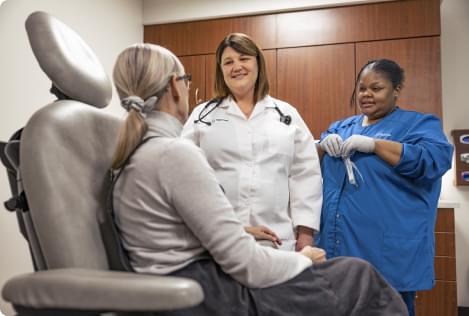Overview
Behcet (beh-CHET) disease, also called Behcet syndrome, is a rare condition. It causes blood vessel swelling, called inflammation, throughout the body.
Behcet disease symptoms can seem like they aren't related at first. They can include mouth sores, eye irritation and swelling, skin rashes and sores, and genital sores.
Treatment involves medicines to ease symptoms of Behcet disease and to prevent serious complications, such as blindness.
Symptoms
Behcet disease symptoms vary from person to person. Symptoms can come and go or become less serious over time. Symptoms depend on which parts of the body the condition affects.
Behcet disease most often affects the following:
Mouth. Painful mouth sores that look like canker sores are the most common sign of Behcet disease. They begin as raised, round sores in the mouth. They quickly turn into painful ulcers.
The sores most often heal in 1 to 3 weeks. But they often come back.
- Skin. Some people get sores that look like acne on their bodies. Others get raised and tender growths called nodules on their skin, mainly on the lower legs.
- Genitals. Open sores can happen on the scrotum or the vulva. The sores are most often painful and can leave scars.
- Eyes. Irritation and swelling, called inflammation, in the eye causes redness, pain and blurred vision. Called uveitis, this inflammation most often affects both eyes. In people with Behcet disease, these symptoms can come and go.
- Joints. Joint swelling and pain often affect the knees in people with Behcet disease. The ankles, elbows or wrists also might be involved. Symptoms can last 1 to 3 weeks and go away on their own.
- Blood vessels. Swelling, called inflammation, in veins and arteries can cause redness and pain. It can cause a blood clot, which leads to swelling in the arms or legs. Inflammation in the large arteries can lead to complications. These include bulges in the artery that can burst, called aneurysms, and narrowed or blocked blood vessels.
- Digestive system. Several symptoms can affect the network of organs that digest food, called the digestive system. Symptoms may include belly pain, diarrhea and bleeding.
- Brain. Swelling, called inflammation, in the brain and nervous system can cause headache, fever, confusion, poor balance or stroke.
When to see a doctor
Make an appointment with your healthcare professional if you have symptoms that might be Behcet disease. If you've been diagnosed with the condition, see your health professional if you get new symptoms.
Causes
Behcet disease might be an autoimmune disorder, which means the body's immune system attacks some of its own healthy cells by mistake. It's likely that gene changes and factors in the environment play a role.
Experts believe that swelling of the blood vessels, called vasculitis, causes the symptoms of Behcet disease. The condition can involve arteries and veins of all sizes. Vasculitis can damage blood vessels all through the body.
Some genes might make people more likely to get Behcet disease. Some researchers think that a germ can trigger the disease in people who have these genes.
Risk factors
Factors that might increase your risk of Behcet disease include:
- Age. Behcet disease most often affects people in their 20s and 30s. But children and older adults also can have the condition.
- Country. People from countries in the Middle East and East Asia, including Turkey, Iran, Japan and China, are more likely to get Behcet disease.
- Sex assigned at birth. Behcet disease can happen to anyone. But the disease is most often worse in people assigned male at birth.
- Genes. Certain genes may be linked with a higher risk of getting Behcet disease.
Complications
Complications of Behcet disease depend on symptoms. For instance, untreated uveitis can lead to loss of vision or blindness. If you have eye symptoms of Behcet disease, see an eye specialist, called an ophthalmologist, regularly. Treatment can help prevent this complication.
Diagnosis
No tests can show that you have Behcet disease. So your healthcare professional mainly makes the diagnosis based on your symptoms. Nearly everyone with the condition gets mouth sores. So mouth sores that come back at least three times in 12 months often are needed for a diagnosis of Behcet disease.
Also, a diagnosis of Behcet disease needs at least two other symptoms, such as:
- Genital sores that keep coming back.
- Swelling and irritation, called inflammation, of the eye.
- Skin sores.
Tests to help diagnose Behcet disease include:
- Lab tests. Blood tests or other lab tests might rule out other conditions.
- Pathergy test. Your healthcare professional puts a sterile needle into your skin and looks at the area 1 to 2 days later. If the test is positive, a small bump forms under your skin where the needle was put in. This shows that your immune system reacts too much to a minor injury.
Treatment
There's no cure for Behcet disease. If you have a mild form, your healthcare professional might suggest medicines to manage the pain and swelling of flares. You might not need medicine between flares. For some people, symptoms get better over time.
For worse symptoms, you might take medicines to manage Behcet disease throughout your body. Plus you might take medicines for flares.
Treatments for symptoms of Behcet disease
Medicines to manage symptoms during flares might include:
- Skin creams, gels and ointments. These products, called topical medicines, are corticosteroid medicines that you put on skin and genital sores.
- Mouth rinses. Special mouthwashes that have corticosteroids and other agents might reduce the pain of mouth sores.
- Eye drops. For mild swelling and irritation, eye drops that have corticosteroids or other medicines might help.
Whole-body treatments for Behcet disease
If topical medicines don't help, you might take a medicine by mouth called colchicine (Colcrys, Mitigare, others). This is for mouth and genital sores that come back. Colchicine also might ease joint swelling.
More recently, the U.S. Food and Drug Administration approved apremilast (Otezla) for the treatment of mouth sores caused by Behcet disease. Side effects may include weight loss and depression.
If you have more-serious Behcet disease, you may need treatments to lessen damage from the disease between flares. Your healthcare professional might prescribe:
-
Corticosteroids to manage swelling and irritation, called inflammation. Corticosteroids, such as prednisone (Rayos), ease the inflammation caused by Behcet disease. Healthcare professionals often prescribe corticosteroids with another medicine to make the immune system less active.
Side effects of corticosteroids include weight gain, heartburn, high blood pressure and bone thinning, called osteoporosis.
Medicines that make the immune system less active. Medicines that keep the immune system from attacking healthy tissues include azathioprine (Azasan, Imuran), cyclosporine (Gengraf, Neoral, others) and cyclophosphamide (Cytoxan).
These medicines can increase the risk of infection. They also can affect the liver and kidneys and cause low blood counts and high blood pressure.
Medicines that change how the immune system responds. Interferon alfa-2b (Intron A) may be used alone or with other medicines to help manage skin sores, joint pain and eye irritation in people with Behcet disease. Side effects include flu-like symptoms, such as muscle pain and fatigue.
Medicines that block a substance called tumor necrosis factor can treat some of the symptoms of Behcet disease. People who have worse symptoms or symptoms that resist treatment might take one of these medicines.
Medicines include infliximab (Remicade) and adalimumab (Humira). Side effects might include headache, skin rash and a higher risk of infections.
Coping and support
No one can predict the course of Behcet disease. And not knowing might be hard. Taking good care of yourself might help you cope with Behcet disease. Try to:
- Rest during flares. When symptoms appear, take time for yourself. Make time in your day to rest when you need to. Try to lower stress.
- Be active when symptoms improve. Moderate exercise, such as walking or swimming, can make you feel better between Behcet disease flares. Exercise can strengthen your body, help keep your joints moving and improve your mood.
- Connect with others. Because Behcet disease is rare, it may be hard to find others with the disease. Ask your healthcare team about support groups in your area. If you can't connect with someone close, the American Behcet's Disease Association offers message boards and chat rooms where you can connect with other people who have the condition.
Preparing for an appointment
You're likely to start by seeing your primary healthcare professional. Your health professional might send you to a specialist who treats arthritis and other rheumatic illnesses, called a rheumatologist.
Depending on your symptoms, you also might need to see an ophthalmologist for eye problems, a gynecologist or urologist for genital sores, a dermatologist for skin problems, a gastroenterologist for digestive troubles, or a neurologist for symptoms that involve the brain or central nervous system.
Here's some information to help you get ready for your appointment.
What you can do
Make a list of:
- Your symptoms, including when they began and how bad they are.
- Key personal information, including major stresses and recent life changes.
- All medications, vitamins and supplements you take, including doses.
- Questions to ask your healthcare team.
Ask a family member or friend to go with you to help you remember the information you receive.
For Behcet disease, questions to ask your healthcare team include:
- What tests do I need? How do I prepare for them?
- Is my condition likely to be brief or long lasting?
- What treatments are there? Which do you advise?
- I have another medical condition. How can I best manage these conditions together?
- Do you have brochures or other printed material that I can have? What websites do you suggest?
What to expect from your doctor
Your healthcare team is likely to ask you questions, such as:
- Do you have your symptoms all the time, or do they come and go?
- What, if anything, seems to make your symptoms better?
- What, if anything, seems to make your symptoms worse?
- Does anyone in your family have an illness like yours?
© 1998-2025 Mayo Foundation for Medical Education and Research (MFMER). All rights reserved. Terms of Use


